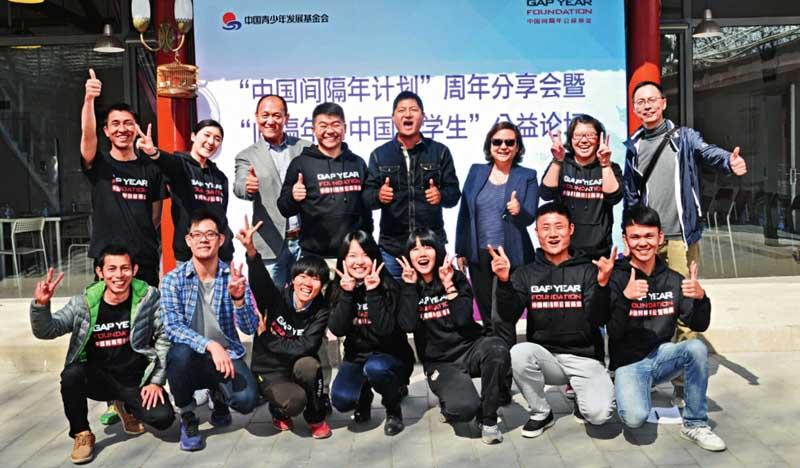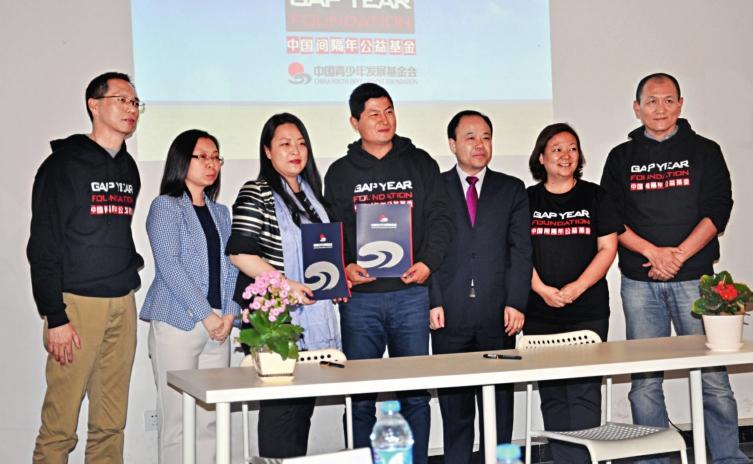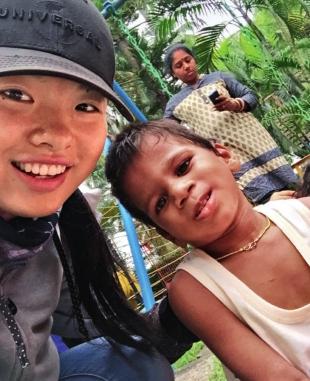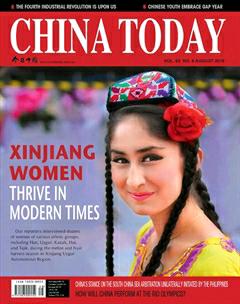Chinese Youth Embrace gap Year
By staff reporter GONG HAN
SUN Dongchun activated his first gap year plan at the end of 2006, when he put his nineto-five life on hold to embark on a three-month journey to India. Financially armed with a modest RMB 21,000 on his bank card, the then 25-year-old took the plunge into an adventure that lasted 13 months, traversed six Asian countries, and was punctuated with occasional volunteering stints at NGOs. After sharing his experiences online he gained a huge following back in China, where the gap year concept was novel, to say the least. In 2009 Sun compiled his postings into the book The Late-coming Gap Year.
Follow Your Heart
Sun was born to a rural family in Guangdong Province. He went barefoot to school, and during his childhood helped to fertilize the family field with pig dung. For such a farmers lad, a trip to the nearest city was a major event –one he would keenly anticipate for days. The paved road leading to the world outside his village seemed infinite. At that time, the idea that he could make a cross-continental trip someday, and see and meet different nationalities of people, including the Japanese girl who later became his wife, was beyond his wildest dreams.
What was the significance of the gap year? “For me, it led to discovery of love. Love is the only word I can think of, not only because I met my Japanese wife, but also because I learned how to love and be grateful to others,” Sun said. As regards how to make the best of a gap year, his advice to other aspirants is first to set a theme – travel, volunteer teaching, or other volunteer services. “There is no set template. It could be whatever you have long yearned to do but have not found time for. Whats most important is that this will be a span of time when you are plucked from your everyday life to determine what you actually desire and follow the call of your heart.”
Chen Chen read The Late-coming Gap Year in his last months at college, when he was at a loss as to his future. The delight the book brought him, in his words, was comparable to the serendipity of stumbling upon a test paper and answer sheet that the teacher unintentionally left in the classroom the day before the final exam of the semester. He was also inspired by the short French animation One Minute Fly, about a fly racing against time to accomplish two dozen tasks in the one-minute journey from birth to death. “I told myself that I have a much longer life to live than this insect. So I made my bucket list, and set out to do something meaningful within a year, something that I had wished for in college but never did,” Chen said.
After pondering on his list, he finally ticked “being a full-time farmer for a year.” Chen lived in the countryside until he was 18, but knew little about it. Under the Youcheng China Social Entrepreneur Foundation Eaglet Program, he went to a village in Yaan, Sichuan Province, which was struggling to get back on its feet after a 7.0 magnitude earth quake in 2013. The program recruits young volunteers to work on charity projects in rural areas for a one-year term.
For almost half a year Chen visited the elderly people in the village. When Chinese New Year approached, the idea of taking the villagers family photos struck him. He raised RMB 20,000 within a month, and commissioned two dozen volunteer photographers. In the week leading up to the Lunar New Year, the team took 157 family photos in addition to 300-odd snapshots, so capturing the first family reunions and New Year celebrations since the devastating earthquake.
Head for the Horizon
The Gap Year Foundation under the China Youth Development Foundation, established in 2014, is the first of its kind in China. It aims to spread the idea of a gap year among Chinese youth and sponsor such practices, so helping them to discover more of the world and them- selves as well.
College students aged 18 to 28 can submit applications together with their plans to the foundation, and those that pass evaluation receive funding for gap year programs ranging from three to 12 months in or out of China.
Liao Xiaohan was among the lucky ones that the foundation sponsored. In October 2015 she left for India to volunteer at the late Mother Teresas Mother House in Calcutta, amid both blessings and jeers. There she was assigned to caring for disabled children. Deeply empathetic to these children, Liao nevertheless felt clueless as how to help or even approach them. At first she just watched and followed the nuns and other volunteers as they extended boundless, unselfish love to their young charges. The medical conditions and prescriptions of each child were exhaustively catalogued, and each cup containing medication marked with the patients name. The sisters knew which child would respond to what kind of amusement, and shared their experience with volunteers.
“Such details gave me impression that the place was not a child care facility but a castle where a host of princes and princesses lived, attended and cherished by loving mothers. This life of happiness started with a mishap, which made me feel both grief and relief,” Liao said.
The shoestring budget in India allowed her no more money than what would meet her basic daily-life needs. At first she was not sure if she could see it through, and considered fleeing the country. But she persisted, and gradually came to appreciate a more Spartan life. “With little baggage, a no-frills hotel room, and simple food, I felt able to concentrate on perceptions of the life I was amid.”
When working with the terminally ill, Liao struggled to figure out the meaning of life for those bedbound and completely dependent on the care of others, and for the volunteers who attended them. Eventually she found the answer. “Once a journalist asked Mother Teresa: Since there are more poor people in the world than you could help, whats the meaning of your work? She picked up the baby she was feeding, and said: it has meaning for her. As Mother Teresa said, many of us are just average Joes and Janes who dont have the ability or chance to change the world. But we still can carve out a meaningful life once we become dedicated to one mission and extend love to a person in our reach.”
Before her trip to India Liao had been harrowed by inexplicable angst. She didnt fathom the reason for it until two months into the program – swelling ambition and greed. “It blinded me to the fundamental happinesses of life, such as air, sunshine, clean water, peace, and the love of family and friends,” Liao said.
“Children at the Mother House are either disabled or have been abandoned by their parents, but are still aware of kindness in this world. The elders at the hospice and palliative care section were forsaken by society and their families earlier in life, but have been fortunate to regain love and dignity as they approach the end of their lives. So they wont be resentful when leaving this world,” Liao said. This observation led her to the understanding that only after stripping life down to the minimum and continuing to journey this world with light baggage can people realize what is most valuable to them.
Lasting Effect
Participants in the Gap Year Foundation program have been to various parts of the world. One rode a bicycle alone across North America; one taught at a primary school in Kenya; one circumnavigated China by bike and videoed the journey; one promoted environmental protection in Tibetan areas; one taught Chinese in Thailand and Sri Lanka; and another traversed Australia on a motorcycle, working at casual jobs on the way to cover expenses.
“These trips – either for volunteering or sightseeing – and the experience of working with charity organizations allow young people the time and space to sit back and contemplate their future and the meaning of life before re-entering society. This hones their ability to think independently, and fosters keen innovation awareness and a stronger sense of social responsibility,” Qiao Xinyu, founder of the Gap Year Foundation, said.
Deng Xiquan, head of the China Youth& Children Research Centers Youth Institute, believes that the growing popular- ity in China of the gap year is a result of the countrys social and economic development, and that it corresponds with the trend of youth development.
The course of the lives of most Chinese youth has been designed by their parents, so all they do is to follow instructions passively. The result is low independence and poor adaptability. The gap year, Deng said, offers youth a chance to break away from the set path, and gain a better vision of their advantages and disadvantages as well as the most desirable qualities to aspire to at this time. They may then more readily find their place in society.
“The gap year allows the youth to grapple with their clashes with society within a permitted scope. It is a try-out process where should any error appear, its damage will be limited. So it gives youth the space for rectification, transformation and reparation,” Deng said.
Taking a gap year under Chinas current school and labor systems, however, entails certain obstacles and risks. For instance, college students have narrower job choices if they dont seek employment or higher education immediately after graduation. And it is only in exceptional circumstances that they can obtain permission to suspend study. Whats more, the financial and personal security issues stemming from doing odd jobs during gap year trips must also be taken into consideration. Deng insists, therefore, that relevant organizations inform applicants of all possible risks, and help them take precautionary measures.
In a retrospective article Liao Xiaohan wrote that if she had not been to India personally, her impression of the country would have been completely shaped by the books she had read and others stories. For instance she would never have known that not all Indians eat with their fingers, and that the swishswoosh of charpati is not heard in every corner of the country.
Whats more important, her gap year experience led to her find what she truly yearns for and at which she excels. Liao is now working for an NGO, and intent on committing her life to public welfare undertakings.
After his gap year concluded, Sun Dongchun married the Japanese girl he met on the trip, and moved to Japan. There he learned the langue and started a new career – teaching at a local Chinese language school and writing and taking photos for publishing houses and media in China.
“From a whitecollar, nine-to-five worker in Guangzhou to a freelancer in another country – this change was beyond my imagination prior to the gap year,” Sun said. But he cautioned that no one should harbor unrealistic expectations that a single adventure will catapult them into finer professional skills and better work and life prospects. His warning to high-flying youth is that the gap year is not a dramatic, romantic journey to plunge into without a second thought, and nor is it an excuse to hide from reality or shun responsibilities.
“I learned to love on the road during the gap year, and put my learning into practice when I came back. I have since cherished life all the more, and been able to cope better with any predicament.”

